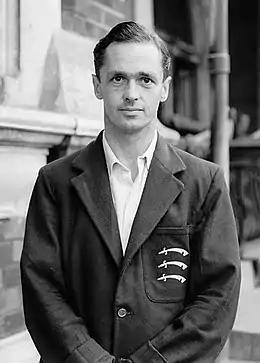George Mann (cricketer)
Francis George Mann, CBE, DSO, MC (6 September 1917 – 8 August 2001) was an English cricketer, who played for Cambridge University, Middlesex and England.[1] He was born at Byfleet, Surrey and died at Stockcross, Berkshire.
 Mann in 1947 | ||||||||||||||||||||||||||||||||||||||||
| Personal information | ||||||||||||||||||||||||||||||||||||||||
|---|---|---|---|---|---|---|---|---|---|---|---|---|---|---|---|---|---|---|---|---|---|---|---|---|---|---|---|---|---|---|---|---|---|---|---|---|---|---|---|---|
| Full name | Francis George Mann | |||||||||||||||||||||||||||||||||||||||
| Born | 6 September 1917 Byfleet, Surrey, England | |||||||||||||||||||||||||||||||||||||||
| Died | 8 August 2001 (aged 83) Stockcross, Berkshire, England | |||||||||||||||||||||||||||||||||||||||
| Batting | Right-handed | |||||||||||||||||||||||||||||||||||||||
| Relations | Frank Mann (father) John Pelham Mann (brother) Simon Mann (son) | |||||||||||||||||||||||||||||||||||||||
| International information | ||||||||||||||||||||||||||||||||||||||||
| National side | ||||||||||||||||||||||||||||||||||||||||
| Test debut | 16 December 1948 v South Africa | |||||||||||||||||||||||||||||||||||||||
| Last Test | 28 June 1949 v New Zealand | |||||||||||||||||||||||||||||||||||||||
| Career statistics | ||||||||||||||||||||||||||||||||||||||||
| ||||||||||||||||||||||||||||||||||||||||
Source: CricInfo, 29 July 2020 | ||||||||||||||||||||||||||||||||||||||||
As a cricketer, George Mann was a right-handed middle-order batsman. His father, Frank Mann, also captained England, making them the first father and son to both captain England.[2] Colin and Chris Cowdrey are the only other father and son to have done this for England.
Early life and education
Mann was born on 6 September 1917 in Byfleet, Surrey, England.[3][4] The son of Frank Mann, he was the brother of John Pelham Mann. He was educated at Eton College, an all-boys public school, and captained the school's cricket XI in 1936.[5] He was also a member of the Eton College Contingent of the Officer Training Corps, and reached the rank of cadet under-officer.[6] He studied at Pembroke College, Cambridge, graduating with a Bachelor of Arts (BA) degree.[3] While at Cambridge, he earned two cricketing blues, having represented the university in 1938 and 1939.[5]
Military service
Mann served in the British Army during the Second World War, having joined up before the outbreak of war.[5] On 8 July 1939, he was commissioned in the Royal Welch Fusiliers as a second lieutenant.[6] He transferred to the Scots Guards on 13 March 1940.[7] He was awarded the Military Cross (MC) in 1942.[4] On 28 June 1945, the then temporary major Mann was awarded the Distinguished Service Order (DSO) "in recognition of gallant and distinguished services in Italy".[8]
Mann maintained his links with the army after the war. On 8 July 1949, he was moved from the Supplementary Reserve of Officers to the Regular Army Reserve of Officers, and was granted the honorary rank of major.[9] Having reached the age limit, he resigned his commission on 6 September 1967 and was permitted to retain his honorary rank.[10]
Cricketing career
Mann captained England in each of his seven Test matches, winning two, and drawing the other five; his father had also been captain in every Test he played in. Wisden said of Mann: "as a captain he was ideal, zealous to a degree, and considerate in all things at all times". After leading England in South Africa in 1948/49, Mann led his side for two Tests in the following summer, before he stood down, citing inability to participate regularly due to his family's brewing business commitments (Mann, Crossman & Paulin).[11]
Mann was chairman of the Test and County Cricket Board (TCCB) from 1978 to 1983.[4] He was therefore chairman during the controversy over the rebel tour which Geoff Boycott and Graham Gooch led to South Africa in 1982.
Later life
Mann was a main board director and retained his position on the new company board when his family brewery merged with Watney Combe & Reid in 1958.[11] He was non-executive Deputy Chairman of the Extel Group from 1980 to 1986.
Mann died on 8 August 2001 in Stockcross, Berkshire, England.[4]
Personal life
In 1949, Mann married Margaret Hildegarde Marshall Clark. Together they had four children: three sons and one daughter. His wife predeceased him, dying in 1995.[3]
Mann's son, Simon, was sentenced for thirty-four years in Equatorial Guinea in 2008, on charges related to an attempted coup in 2004, but was pardoned on 2 November 2009.
References
- "George Mann". www.cricketarchive.com. Retrieved 23 March 2012.
- Bateman, Colin (1993). If The Cap Fits. Tony Williams Publications. p. 116. ISBN 1-869833-21-X.
- 'MANN, (Francis) George', Who Was Who, A & C Black, an imprint of Bloomsbury Publishing plc, 1920–2016; online edn, Oxford University Press, 2014; online edn, April 2014 accessed 24 Nov 2017
- Hodgson, Derek (16 August 2001). "George Mann". The Independent. Retrieved 24 November 2017.
- "George Mann". The Daily Telegraph. 13 August 2001. Retrieved 24 November 2017.
- "No. 34643". The London Gazette. 7 July 1939. p. 4667.
- "No. 34809". The London Gazette (Supplement). 8 March 1940. p. 1464.
- "No. 37151". The London Gazette (Supplement). 26 June 1945. p. 3375.
- "No. 38659". The London Gazette (Supplement). 8 July 1949. pp. 3337–3338.
- "No. 44401". The London Gazette (Supplement). 1 September 1967. p. 9668.
- Janes, Hurford (1963). The Red Barrel: A History of Watney Mann. John Murray. p. 175.
External links
| Sporting positions | ||
|---|---|---|
| Preceded by Norman Yardley |
English national cricket Captain 1948/9–1949 |
Succeeded by Freddie Brown |
| Preceded by Walter Robins |
Middlesex County Cricket Captain 1948–1949 |
Succeeded by Walter Robins |